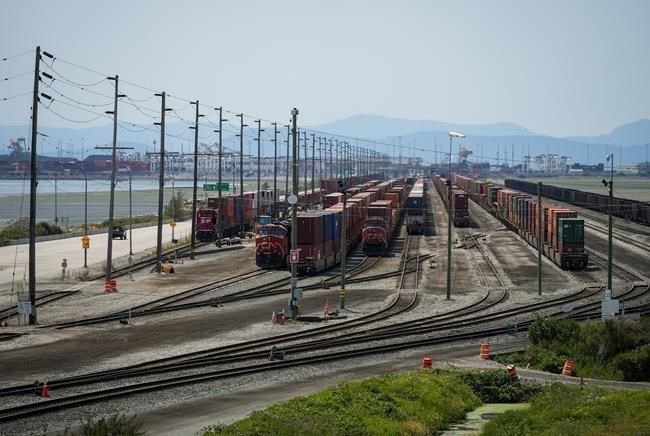
Trains are seen as cargo containers sit idle on rail tracks in Delta, B.C., on Friday, July 7, 2023. The U.S. Department of Justice in Washington State says two men are facing human smuggling charges for their alleged role in a scheme to get people across the Canada-U.S. border in B.C. on freight trains.
Image Credit: THE CANADIAN PRESS/Darryl Dyck
May 29, 2024 - 11:30 AM
VANCOUVER - The U.S. Department of Justice says two men are facing human smuggling charges in Seattle for their alleged role in what it calls a dangerous scheme to transport people out of British Columbia and across the border on freight trains.
U.S. Attorney for the Western District of Washington Tessa Gorman says 45-year-old Jesus Ortiz-Plata of Oregon and 35-year-old Juan Pablo Cuellar Medina of Washington were arrested last week, along with three non-citizens who were allegedly smuggled out of Canada.
Gorman says Ortiz-Plata and Medina employed "an extremely dangerous smuggling scheme," and that in one case last August, 29 people were rescued from a freight car filled with plastic pellets.
An affidavit by a U.S. Homeland Security officer says 28 were Mexican nationals and one was Colombian guiding the group, whose presence was noticed around 1 a.m. when border officers saw anomalies in an X-ray of the car.
Court documents outlining the charges filed in Seattle on Friday say Ortiz-Plata and Medina came to the attention of investigators last July, after Border Patrol agents identified a phone number associated with "numerous human smuggling events" through Blaine, Wash., dating back to September 2022.
The Homeland Security investigator's affidavit says Ortiz-Plata and Medina were arrested on May 23, after being tracked by law enforcement agents to an apartment complex in Everett where they believe the pair picked up non-citizens seeking unlawful entry into the U.S.
After being detained, agents questioned the three unnamed men who were found travelling with Ortiz-Plata and Medina, the affidavit says.
Two of the men were interviewed by border agents in Spanish, revealing they were brothers originally from Honduras who had flown into Vancouver three days before their arrest to be smuggled over the border destined for Portland, Ore.
One of the brothers told agents they had originally gone to the U.S. illegally but had been working in Calgary for several months.
The brothers, the agent's affidavit says, gave slightly different accounts of how they came to be smuggled over the border.
One said they'd flown into Vancouver, while the other told border agents that they'd taken a bus and paid $2,000 each to the alleged smugglers.
One said they paid $4,000 each to an "unknown smuggler" and were picked up by a "Hispanic male" and taken to a train station where they met the third man they were picked up with, who agents discovered was from India.
“The Hispanic male told them to climb on board the train and hide in the natural voids within the railcars of the freight train,” the affidavit says.
After riding the train for about two hours, the trio were picked up by another unknown person and taken to an apartment, the document says.
The third man picked up with Ortiz-Plata and Medina was interviewed in Hindi, telling agents he had flown into Toronto 15 days earlier and had been connected with smugglers by someone from his home village.
The man told agents he had arrived in Vancouver five days before he was arrested on the U.S. side of the border, and was driven to the border and told to walk across and meet a waiting vehicle, the affidavit says.
Department of Justice officials in Washington believe the pair are also linked to the August 2023 discovery of 29 people in a freight car at a rail facility in Blaine, just across the border with B.C.
“Being locked in a freight train car is dangerous – there is no control over the heat, cold or ventilation, and people can be injured or killed by shifting freight," Gorman said in a news release.
Ortiz-Plata and Medina face up to 10 years in prison and a fine of US$250,000.
This report by The Canadian Press was first published May 28, 2024.
News from © The Canadian Press, 2024